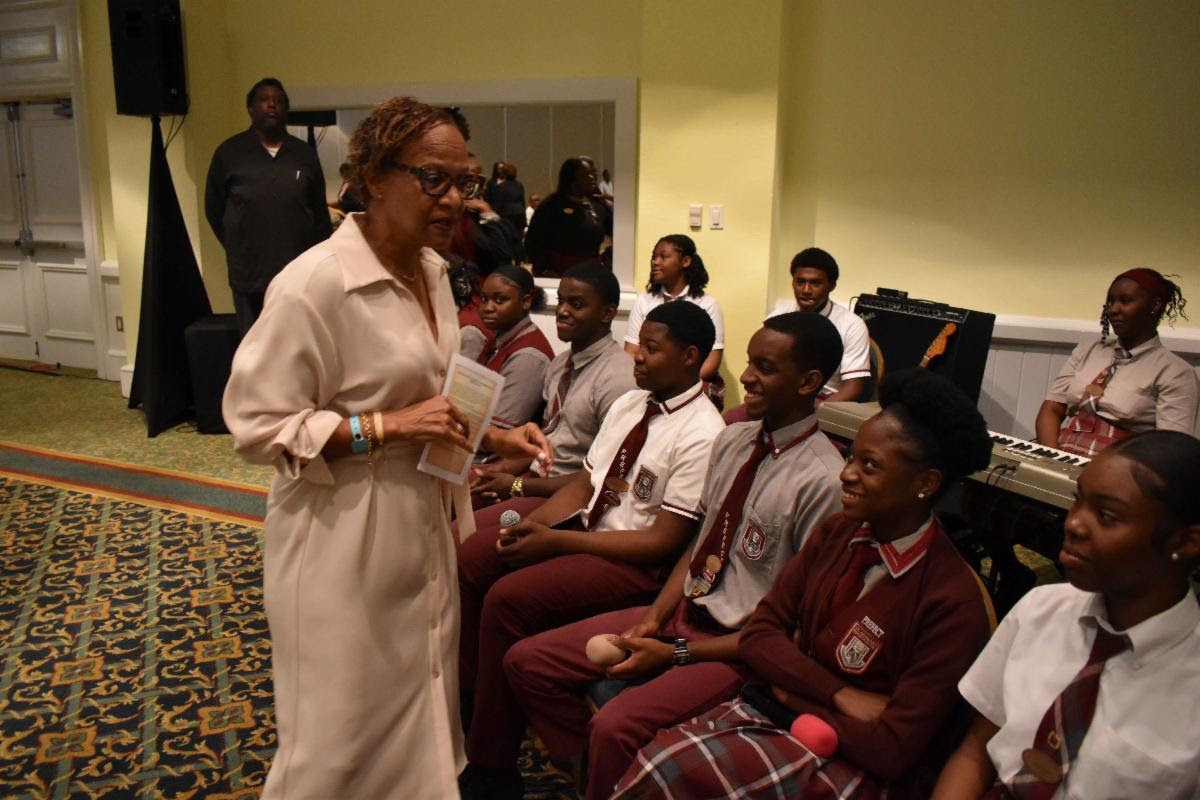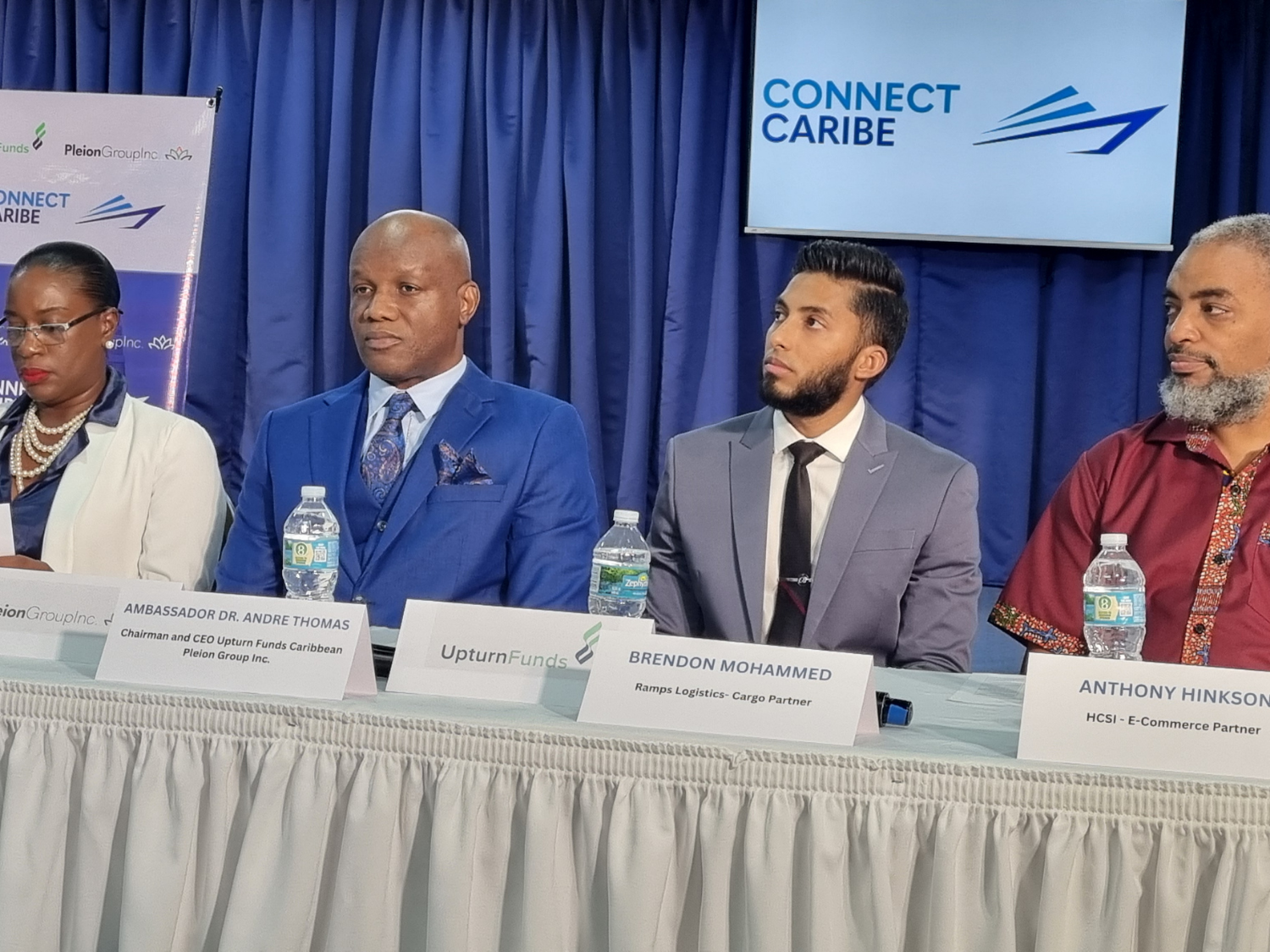By Dr Edward Greene
Sir Alister died on April 20, 2019. We mourn his loss and extend our deepest sympathy to his wife Lady Marjorie Mc Intyre and children, Arnold, Andrew, Helga and Nicholas. I was privileged to pay tribute at the 2017 University of the West Indies (St Augustine Campus Trinidad and Tobago) Conference on the Economy that honored Sir Alister, and reproduced below. It was entitled “Reflections on Sir Alister McIntyre- a unique brand and a colossus”. It may well have been: ‘expressing gratitude to Sir Alister for touching my life’.
This is indeed an opportunity to pay tribute to a Caribbean icon who has made such a monumental contribution to regional and international developments. They encompass a creative vision and intellectual leadership that transformed academia, assisted in fashioning the regional integration movement and projected the role of the Caribbean within the construct of a new international economic order.
I knew of Alister McIntyre long before I met him. Those of us who studied in the University of London system and for that matter, anywhere in the UK in the 1960s, could not fail to be regaled with the outstanding academic feats of the brilliant Grenadian/ Caribbean Student at the London School of Economics who graduated with First Class honours. Nor can those of us who followed the sad demise of the West Indies Federation in 1966, fail to recall the role of the formidable regional revival team of William Demas, Alister McIntyre and Shridath Ramphal which master minded CARIFTA and its transition to CARICOM.
For me whose seven (7) year stint of undergraduate and graduate studies was in the metropolis in the UK, Canada and the USA, the thirst for analysis on Caribbean economic development was largely quenched by several articles written by Alister McIntyre in the Journal for Social and Economic Studies and the New World Magazines. Most pertinent however for me, studying in Canada at the time, was his 1966 book with Kari Levitt on The Political Economy of Canadian-West Indian Relations.
When therefore in May 1968, the day after I completed my comprehensive examinations for the Ph.D at the University of British Columbia, l received a letter from the Registrar of UWI offering an appointment as a Junior Research Fellow at Institute of Social and Economic Research (ISER) St Augustine, I was ecstatic. It didn’t matter that the salary offered was less than my Canada Council Graduate Fellowship, I was returning to the region — and guess what— to work with Allister McIntyre who was by then Director of the ISER.
This had to be among the best professional decisions anyone could make. As it turned out, I was the beneficiary of Alister’s creative leadership and mentorship that supported, challenged, encouraged and trusted my ability and that of my colleagues. Among those who joined the McIntyre clan at the same time, was Edwin Carrington, who was to become the Secretary General of the African Caribbean and Pacific (ACP) Secretariat in Brussels and subsequently, CARICOM Secretary General for 18 years. In the latter position Sir Edwin walked in the footsteps of our mentor, “Mack”, and I served as his Assistant Secretary General (2000-2010).
In the intervening years, it was my good fortune — not once, but twice — to actually witness at close range, Alister in full flight: first, as his Deputy Director for ISER 1972-1974 on the Mona Campus, before he left academia to succeed his good friend Willie Demas as Secretary General of CARICOM, and second, in 1889-1993 as Pro Vice Chancellor after he assumed the Vice Chancellorship of UWI in 1988.
In the first period, we his Deputy Directors, which included Vaughan Lewis in Barbados and Jack Harewood in St Augustine, viewed with awe, the enormity of his portfolio of activities that required intellectual leadership and profound diplomatic instincts. In addition to his responsibility for guiding the research, publication, outreach and resource mobilization of ISER, he was Special Adviser to UNECLAC, the CARICOM Trade Delegation to Europe, and to several Prime Ministers and Governments on technical economic matters, simultaneously. He was also UWI’s representative on the Board of the Association of Caribbean Universities and Research Institutes (UNICA), among many others.
In this context, he accurately reports in his recent book The Caribbean and the Wider World his difference with the prevailing view that ISER should give priority to the intellectual/academic rather than policies issues. I vividly recall his advocacy that if ISER were to maintain its relevance, its research must focus on addressing the problems of the communities to which it related and from which it drew basic support. This did not mean taking political sides. His views became guiding principles for the programme of work of ISER under Vaughan Lewis who succeeded him as Director in 1975 and me, who succeeded Vaughan in 1982.
During the second period, Alister’s leadership of UWI from 1988 will no doubt go down in history as the modernization of the University’s system. I was intricately involved in the first five years of his tenure as Vice Chancellor: co-opted to Mona’s rehabilitation committee in 1988 and then appointed Pro Vice Chancellor, Development and Alumni Relations 1989-93. His was the arduous task of leading the charge of rebuilding the Mona Campus after its devastation by the category 5 – Hurricane Gilbert on September 12, 1988, just 12 days after he arrived in Jamaica to take up the appointment as Vice Chancellor. It was a test to his fortitude and resolve that the campus was reopened on November 1, within the statutory regulations allowed for an academic year. The new Vice Chancellor marshaled his troops, and mobilized support, nationally, regionally and internationally to make this happen. Much of this success for the hurricane relief and rebuilding efforts was due to the rigour and persuasiveness of his presentations to insurance companies, the national and regional private sector and external donors and to the high esteem in which he was held.
Having stabilized the relief efforts, the Vice Chancellor initiated a 10 year development plan (1990-2000) with a series of priorities among which, to increase the university enrollment by 50% to 18,000 students, off campus enrollments to benefit the non Campus countries and research and development in Science and Technology. My Office of Development and Alumni Relations within the Vice Chancellory managed several projects including a grant from the Canadian International Development Agency (CIDA) for Institutional Strengthening, and worked together with Prof. Compton Bourne, Pro Vice Chancellor, Planning and Development in designing and securing a substantial US$40M loan from the Inter American Development Bank under the leadership of the Vice Chancellor. These resource mobilization efforts of the Vice Chancellor triggered the enhancement of Faculties and student facilities on all three campuses and strengthened governance arrangements of the university system.
I was also particularly pleased that as the first Pro Vice Chancellor with responsibility for Alumni Relations in collaboration with the UWI Guild of Graduates whose President was Beverly Perreira, to have presided over initiating a plan for revamping the Alumni System, promoted by Vice Chancellor McIntyre as an integral component of the viability of the University. The “Gathering of Graduates” in April 1993 which brought together approximately 800 alumni (and approximately 1000 participants) headlined by Nobel Laureate, Dereck Walcott, remains etched in my memory as a tribute to Alister McIntyre and to its gracious patron, former Vice Chancellor, Sir Phillip Sherlock.
When Alister McIntyre retired as Vice Chancellor in 1998, he left the UWI on a trajectory of institutional viability and transformation as well as international credibility beyond all expectations. He would be the first to let you know that this was achieved because of robust teams he built along the way, the role of the Chancellor, Sir Shridath Ramphal and the succession planning that left many of those he mentored to continue the process.
But, I, and most of us, who were part of his administration, could reflect on the positive responses to these efforts to which I have referred. They were indeed largely due to the international reputation and wide ranging contacts of Alister McIntyre. He seemed to know all the influential players in the global arena. And this was no doubt as a result of the expansive reach of his distinguished academic career and profound reputation and contributions to the “Caribbean and the Wider World “
Throughout his journey, the role of his wife, Marjorie who stood beside him, has been inestimable. We commend her highly for her generosity of spirit in sharing her remarkable husband with so many of us for such an extended period. Enjoining her to this Tribute can only minimally compensate for our inadequate appreciation.
I struggled for a summary statement for this tribute and could find no more appropriate description of Alister McIntyre than the type of leader exalted in the writings of Charles Erwin Wilson: “a boss who makes others realize they have more ability than they think they have so they can consistently do better than they thought they could”.
For all these reasons and more, Sir Alister Mcintyre (Mack to most of us) is truly a unique Brand and a Colossus, which I am sure, will be immortalized and whose memory will remain undiminished.
(Edward Greene, Professor Emeritus – UWI)




